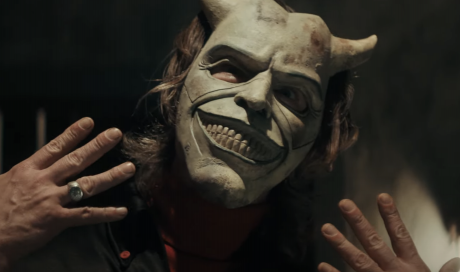Last night I saw portions of Scott Derrickson‘s The Black Phone (Universal, 6.26). Okay, I watched the first 30 or 40 minutes, then I began nodding off, in and out. I finally gave up and escaped. It was Jett and Cait‘s decision to rent it, and I didn’t have the character or the courage to argue or suggest an alternative. I sat there in an uncomfortable position on the couch (looking up and to the left), and submitted. I have no excuse.
The Black Phone struck me as fairly awful in a hand-me-down way. And I find it hugely depressing that it’s made $105 million so far. Millennial and Zoomer-aged horror fans have no taste — they’ll sit through anything. Oh, how I hate those Blumhouse horror chops — mulchy, derivative, eye-rolling.
My feelings of distaste quickly grew into repulsion, and very early on, I should add. And this 103-minute prsogrammer is composed of horror elements I’ve seen before and didn’t think anyone would have the guts to recycle — late ’70s suburban milieu, a child-killing, mask-wearing fiend in the Pennywise/Buffalo Bill/Freddy Krueger mold (aka “the Grabber,” a take-the-money-and-run performance by Ethan Hawke), a good-hearted but cowardly young hero (Mason Thames), a young girl with Shining-like psychic abilities (Madeleine McGraw), a cellar dungeon where the Grabber imprisons his victims (The Silence of the Lambs), doltish detectives, a boozy and abusive dad (Jeremy Davies). And it’s based on a short story by Stephen King‘s 50-year-old son, Joe Hill.
Derrickson and co-screenwriter C. Robert Cargill push every button and yank every lever they can think of, and very little amounts to anything I would call unnerving or even half-scary. Talking to The Grabber’s dead victims on a dead phone isn’t scary at all — it’s just “oh, okay, a device.” I counted two mild jolt moments. (Or maybe I dreamed them.) The feeling of being fed the same old mid-teen suburban horror tropes is terrible…it makes you feel trapped and drugged and humiliated. I wanted Davies’ scum-dad to somehow die, and I consider it ludicrous that (according to the Wiki synopsis) he ends up apologizing for his brutality.
The fact that moviegoers routinely buy into films of this calibre…I don’t want to think about it. But anyone who watches this film and says “hey, not bad”…that person is not in a good place, cinematically speaking.



